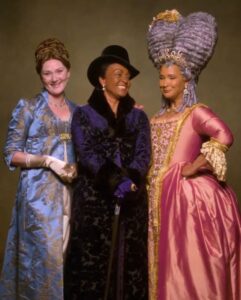
Queen Charlotte, the character from Bridgerton, has captured audiences worldwide with her elegance, power, and captivating storyline. While Bridgerton presents a dramatized version of her life, Queen Charlotte was, in fact, a real historical figure. But who was the true Queen Charlotte, and what made her so influential in British history?
The Real Queen Charlotte: A Historical Overview
Queen Charlotte, born Sophia Charlotte of Mecklenburg-Strelitz in 1744, became the wife of King George III in 1761. Her marriage to George III made her the Queen Consort of Great Britain and Ireland. Despite the challenges of royal life, Charlotte’s legacy is one of compassion, cultural patronage, and resilience.
As queen, Charlotte was known for her love of the arts, supporting the works of famous figures such as Johann Christian Bach and Sir Joshua Reynolds. Her intellectual curiosity led her to foster a vibrant cultural environment at court, where music, art, and literature flourished. Charlotte’s influence extended beyond the arts; she also took an active role in social issues, especially those related to education and charity.
Queen Charlotte’s Personal Life: Love and Challenges
While Bridgerton portrays a romanticized relationship between Queen Charlotte and King George III, their real-life marriage was a complex and emotional journey. The couple had 15 children together, and their marriage was based on mutual respect and affection, though it was tested by the king’s mental health struggles.

King George III suffered from bouts of mental illness, a condition that was not widely understood at the time. These episodes deeply affected both him and Queen Charlotte, who stood by him throughout his struggles. This aspect of their relationship, though often overlooked in popular depictions, is a testament to Queen Charlotte’s strength and dedication.
Queen Charlotte’s Legacy: More Than a Character in “Bridgerton”
While Bridgerton presents Queen Charlotte as a bold and powerful figure navigating the complexities of court life, the real Queen Charlotte was a true pioneer in many respects. She was not just a queen consort, but also an active participant in shaping the cultural and political landscape of her time.
Charlotte’s involvement in the education of her children, her patronage of the arts, and her support for important social causes left an indelible mark on history. Furthermore, her role in court politics was significant, as she worked closely with King George III to manage royal affairs and navigate the turbulent political landscape of the 18th century.
Why Queen Charlotte’s Story Matters Today
Queen Charlotte’s portrayal in Bridgerton may be fictionalized, but it has sparked renewed interest in her real-life story. The character’s strength, intelligence, and grace resonate with modern audiences, especially as we continue to celebrate powerful women throughout history.
Queen Charlotte’s impact on culture, politics, and society was significant, and her story deserves to be remembered not only through the lens of television but also as part of the rich tapestry of British royal history.
Conclusion: The Real Queen Charlotte
While Bridgerton offers a tantalizing glimpse into the life of Queen Charlotte, the real queen was a multifaceted and inspiring figure. Her life story goes beyond the drama of royal life and demonstrates the enduring power of compassion, intellect, and resilience. From her cultural patronage to her commitment to her family, Queen Charlotte’s legacy continues to inspire and influence, both in history and in the fictionalized retelling of her life on screen.
Whether through her role in Bridgerton or in the pages of history, Queen Charlotte’s story reminds us of the strength and resilience of women who shaped the course of history, making her not just a fictional queen, but a true royal icon.